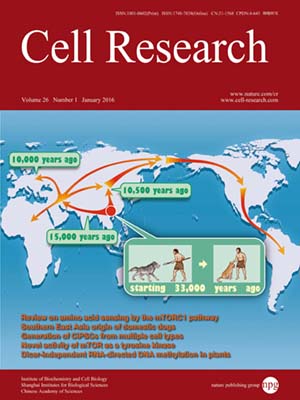
Volume 26, No 1, Jan 2016
ISSN: 1001-0602
EISSN: 1748-7838 2018
impact factor 17.848*
(Clarivate Analytics, 2019)
Volume 26 Issue 1, January 2016: 21-31 | Open Access
ORIGINAL ARTICLES
Out of southern East Asia: the natural history of domestic dogs across the world
Guo-Dong Wang1,*, Weiwei Zhai2,*, He-Chuan Yang1,2,3,*, Lu Wang4,*, Li Zhong4, Yan-Hu Liu4, Ruo-Xi Fan4, Ting-Ting Yin1,5,6, Chun-Ling Zhu1, Andrei D Poyarkov7, David M Irwin8, Marjo K Hytönen9, Hannes Lohi9, Chung-I Wu10, Peter Savolainen11 and Ya-Ping Zhang1,4
1State Key Laboratory of Genetic Resources and Evolution, and Yunnan Laboratory of Molecular Biology of Domestic Animals, Kunming Institute of Zoology, Chinese Academy of Sciences, Kunming 650223, China
2Human Genetics, Genome Institute of Singapore, A*STAR, 60 Biopolis Street, Genome #02-01, Singapore 138672, Singapore
3Department of Molecular and Cell Biology, School of Life Sciences, University of Science and Technology of China, Hefei 230026, China
4Laboratory for Conservation and Utilization of Bio-resource & Key Laboratory for Microbial Resources of the Ministry of Education, Yunnan University, Kunming 650091, China
5University of Chinese Academy of Sciences, Beijing 100049, China
6Kunming College of Life Science, University of Chinese Academy of Sciences, Kunming 650223, China
7Severtsov Institute of Ecology and Evolution, Russian Academy of Science, 33 Leninskiy Prospect, Moscow 119071, Russia
8Laboratory Medicine & Pathobiology, University of Toronto, 1 King's College Circle, Rm 6211, Toronto, ON, Canada M5S 1A8
9Research Programs Unit, Molecular Neurology and Department of Veterinary Biosciences, University of Helsinki and Folkhälsan Research Center, Helsinki, Finland
10Department of Ecology and Evolution, University of Chicago, 5801 S Ellis Ave, Chicago, IL 60637, USA
11Department of Gene Technology, KTH-Royal Institute of Technology, Science for Life Laboratory, Tomtebodavägen 23A, 17165 Solna, Sweden
Correspondence: Ya-Ping Zhang, E-mail: zhangyp@mail.kiz.ac.cn; Peter Savolainen,(savo@biotech.kth.se)
The origin and evolution of the domestic dog remains a controversial question for the scientific community, with basic aspects such as the place and date of origin, and the number of times dogs were domesticated, open to dispute. Using whole genome sequences from a total of 58 canids (12 gray wolves, 27 primitive dogs from Asia and Africa, and a collection of 19 diverse breeds from across the world), we find that dogs from southern East Asia have significantly higher genetic diversity compared to other populations, and are the most basal group relating to gray wolves, indicating an ancient origin of domestic dogs in southern East Asia 33 000 years ago. Around 15 000 years ago, a subset of ancestral dogs started migrating to the Middle East, Africa and Europe, arriving in Europe at about 10 000 years ago. One of the out of Asia lineages also migrated back to the east, creating a series of admixed populations with the endemic Asian lineages in northern China before migrating to the New World. For the first time, our study unravels an extraordinary journey that the domestic dog has traveled on earth.
10.1038/cr.2015.147
FULL TEXT | PDF
Browse 3304


